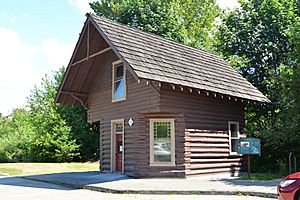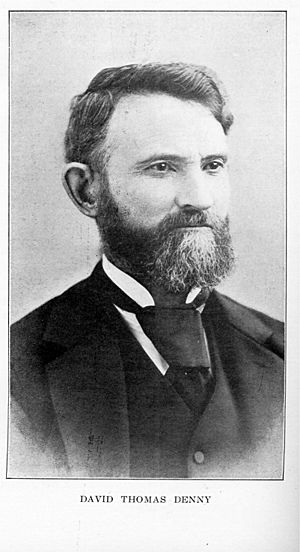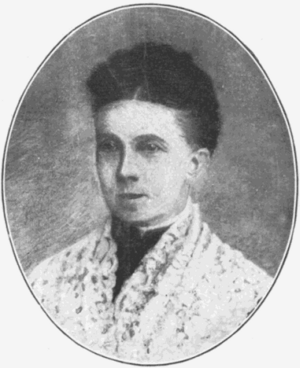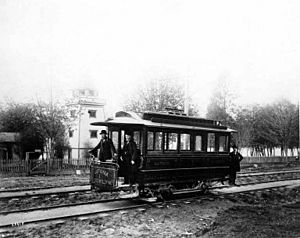David Denny facts for kids
David Thomas Denny (born March 17, 1832 – died November 25, 1903) was an important early settler of Seattle, Washington, USA. He was part of the famous Denny Party, a group often called the founders of Seattle. Even though he faced financial challenges later in life, David Denny played a big role in shaping the city. He was known as someone who would help if you had a good idea for Seattle and needed support or money.
Contents
David Denny's Early Life and Journey West
David Denny was born in Putnam County, Illinois. In 1851, he traveled west to Oregon with his family and other settlers. This group became known as the Denny Party, named after David's older brother, Arthur A. Denny. They made the long trip in a covered wagon.
On September 25, 1851, David, along with John Low and Lee Terry, arrived by boat at the future site of Seattle. John Low left to meet the rest of the group, and Lee Terry went south to find tools. David Denny, who was too young to claim land on his own, was briefly the only person from the group at Alki in what is now West Seattle.
Marriage to Louisa Boren
On January 23, 1853, David Denny married Louisa Boren. She was also a member of the Denny Party and his sister-in-law. Their wedding was the first non-Native American wedding in the city. It was performed by "Doc" Maynard. David and Louisa had eight children together, including Emily Inez Denny.
David was good at learning languages. Unlike some other settlers, he got along well with the Native American people in the area.
Denny's Land and Contributions to Seattle
In 1853, David and Louisa Denny claimed a large piece of land, about 640 acres (2.6 km²). This was a standard size for a married couple at the time. Their land stretched from what is now the Seattle Center east to South Lake Union. The southern border of their land is now Denny Way.
In 1882, a large sawmill called the Lake Union and Lumber Company opened on this land near Lake Union. David Denny bought the mill in 1884 and renamed it the Western Mill. The next year, he dug a channel from Portage Bay to Lake Washington. This allowed logs to be floated from the larger Lake Washington to Lake Union for his mill. Denny ran the Western Mill until 1895. His employees and their families were some of the first people to live in the South Lake Union area.
The Dennys also gave land for important city spaces:
- Seattle's first cemetery (1861) was on Denny's land. Later, the bodies were moved to Washelli Cemetery.
- They donated land for what became Lake View Cemetery on Capitol Hill.
- They gave 5 acres (20,000 m²) for the city's first park, now called Denny Park in their honor.
- Another donation became the site of the Civic Auditorium, which is now part of the Seattle Center.
David Denny's Public Service
David Denny was active in public life and held several important positions:
- He served as a probate judge.
- He was a King County Commissioner.
- He was a member of the Seattle City Council.
- He was a director for the Seattle School District.
- He was a regent (a governing board member) for the Territorial University of Washington, which later became the University of Washington.
Denny supported women's right to vote and the temperance movement (which aimed to reduce alcohol use). He also spoke out against the Anti-Chinese movement in the mid-1880s.
Business Ventures and Success
In the early 1880s, David Denny was one of Seattle's richest citizens. His wealth was estimated at about US$3 million. His business interests went beyond his original land and mill. He also farmed in the Duwamish River valley and helped plan new Seattle neighborhoods, including the Ravenna Park area.
In 1890, he moved his family into a large mansion at the foot of Queen Anne Hill. The next year, he started the Rainier Power and Railway Company. This company provided the first streetcar service from Downtown to the University District. The streetcar line ran from 3rd Avenue and Yesler Way in Pioneer Square to NE 55 Street and 22nd Avenue NE. It included the Latona Bridge, which opened in 1891.
Financial Challenges

Sadly, David Denny's financial success did not last. Between 1888 and 1895, two of David and Louisa Denny's children passed away. They also faced a major financial crisis during the Panic of 1893. They lost almost everything, including their new mansion. Even the bank where his brother Arthur was a senior vice president was among the creditors who forced him into bankruptcy.
Their only comfort was that they had given a piece of land in Licton Springs (in northern Seattle) to their daughter Emily when they were wealthy. They moved to this land after losing their fortune.
David Denny's Later Years
In 1899, at age 67, David Denny took a job overseeing improvements on the Snoqualmie Pass road. This is the route now used by Interstate 90. During this work, he was injured when a worker accidentally hit his head with an ax. He bandaged his own wound and kept working. The next year, he was in the same area near Keechelus Lake, helping a mining company search for gold.
David Denny lived only a few more years and died at Licton Springs in 1903. His wife, Louisa Boren Denny, lived until 1916. They are both buried at what is now the Evergreen Washelli cemetery, near the land they once owned and lost.
David Denny's Legacy
The names of David Denny and Louisa Boren live on through two schools in the Seattle Public Schools district:
- Denny International Middle School
- K-5 STEM @ Boren (which used to be Louisa Boren Middle School)
Both schools are located in the West Seattle area.
 | Claudette Colvin |
 | Myrlie Evers-Williams |
 | Alberta Odell Jones |




